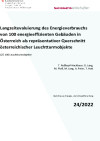Suchergebnisse
IEA Vernetzungstreffen - Forschung für die Energiewende - FÜR alle und MIT allen
29. September 2021
Hilton Danube Waterfront, Handelskai 269, 1020 Wien
Die Veranstaltung widmete sich dem Thema Einbindung von BürgerInnen in Innovationsprozesse und diente dem Austausch von Neuigkeiten aus den Technology Collaboration Programmes, Tasks und Annexen der IEA Forschungskooperation.
Monitoring of multi-family houses “Tonpfeifengasse”
Evaluation of activated building parts as heat storage for renewable energy shown on the example of the multi-family houses "Tonpfeifengasse".
IEA Bioenergy: Biomass Supply and the Sustainable Development Goals – International Case Studies (2021)

37 Best-Practice-Fallstudien aus 18 Ländern wurden von den Mitgliedern des IEA Bioenergy Technology Collaboration Programme ausgewählt, um zu zeigen, wie Biomasse-Lieferketten zur Unterstützung einer nachhaltigen Bioenergieerzeugung eingesetzt werden können, während gleichzeitig ein Beitrag zu den Zielen der Vereinten Nationen für nachhaltige Entwicklung geleistet wird.
Herausgeber: IEA Bioenergy, 2021
Englisch, 94 Seiten
Downloads zur Publikation
Info-Workshop GRÜNSTATTGRAU: Network-Inspire-Innovate - METABUILDING Funding 2022! - GRÜNSTATTGRAU
12. Mai 2022
BAUZ! Congress (WKO, Wiedner Hauptstraße 63, 1040 Wien) und online
Das Horizon2020 Projekt „METABUILDING“ finanziert Innovationen von Klein- und Mittelunternehmen mit bis zu 60.000 Euro. Am 12. Mai findet ein internationaler Workshop statt, welcher über die Ausschreibung informiert, Interessent:innen vernetzt und bei der Ideenfindung unterstützen soll.
Kreislaufwirtschaft für alle – Incentives, Enabler und Inhibitoren für einen nachhaltigen Konsum (CE4ALL)
Das Projekt zielt darauf ab, auf Basis einer Analyse des derzeitigen milieuspezifischen Konsumverhaltens branchenspezifische Incentives und Enabler zur Stärkung der Kreislaufwirtschaft herauszuarbeiten und Inhibitoren aufzudecken. Inklusionsaspekte werden berücksichtigt. CE4ALL arbeitet abseits der bislang produktionsorientierten Betrachtungen von Kreislaufwirtschaft an einer konsumzentrierten Untersuchung.
Langzeitevaluierung des Energieverbrauchs von 100 energieeffizienten Gebäuden in Österreich als repräsentativer Querschnitt österreichischer Leuchtturmobjekte (LZE 100 Leuchtturmobjekte)

Erfassung, Auswertung und Analyse von Energieverbrauchsdaten von 100 energieeffizienten Gebäuden in Österreich über eine Betriebszeit von 3 bis 25 Jahren als repräsentativer Querschnitt der österreichischen Leuchtturmobjekte. Differenzierung nach Gebäudetypen, Energieträger und Ermittlung der realen Treibhausgas-Emissionen. Vergleich der gemessenen Verbräuche zu Benchmark-Werten.
Schriftenreihe
24/2022
T. Roßkopf-Nachbaur, G. Lang, M. Ploß, M. Lang, A. Peter, T. Hatt
Herausgeber: BMK
Deutsch, 143 Seiten
Downloads zur Publikation
Dritte Ausschreibung "Fabrik der Zukunft"
Die Programmlinie "Fabrik der Zukunft" im Impulsprogramm "Nachhaltig Wirtschaften" lädt ProjektwerberInnen bis zum 30. September 2003 zur Einreichung ein.
"Haus der Zukunft"-Symposium im Juni 2016
Am 28. Juni lädt das BMVIT zum "Haus der Zukunft"-Symposium an die TU Wien. Vorgestellt wird die Evaluierung des Forschungsprogramms, der Festvortrag widmet sich der Zukunft des Bauens. In drei Podiumsrunden wird der Blick sowohl nach vorn als auch zurück gerichtet.
Vierte Ausschreibung "Fabrik der Zukunft"
Die Programmlinie "Fabrik der Zukunft" im Impulsprogramm "Nachhaltig Wirtschaften" lädt ProjektwerberInnen ab sofort zur Einreichung ein.
Environmental Management and Innovation
Der Tagungsband und die Fotogalarie von der Präsidentschaftskonferenz sind jetzt verfügbar.
Marktentwicklung Alternativenergie 2005
Der Alternativenergie-Bericht 2005 belegt: In Österreich boomt die Solar- und Erdwärme
IEA Wind: Strategic Research Agenda 2014
Die Europäische Wind Energie Technologie Plattform (TPWind) präsentiert aktuelle Forschungs- und Entwicklungsschwerpunkte.
www.ideenreich.at - eine Initiative des BMVIT
Das BMVIT sucht mit der Initiative www.ideenreich.at die kreativsten Ideengeber des Landes. Worüber ärgern sich die Menschen täglich? Was muss ihrer Meinung nach unbedingt schnellstens erfunden werden?
Pilotausschreibung FEMtech FTI Projekte
Seit 20. Oktober ist die Ausschreibung der neuen Programmlinie FEMtech FTI-Projekte geöffnet. Gefördert werden F&E-Projekte mit Gender-Schwerpunkt. Einreichfrist: 27. Jänner 2009
Bericht vom IEA Vernetzungstreffen 2012
Beim jährlichen Vernetzungstreffen der nationalen AkteurInnen innerhalb des Programms IEA-Forschungskooperation wurde das nationale Netzwerk gestärkt und der Erfahrungsaustauch angeregt. Die Ergebnisse des Treffens sind nun verfügbar.
Workshop "Haus der Zukunft in der Praxis"
Lebenszykluskosten von Gebäuden - Veranstaltungsdokumentation online
Messe: RENEXPO® Austria 2009
26. - 28. Nov 2009
Messezentrum SalzburgSalzburg, AT
Internationale Fachmesse mit Kongress für erneuerbare Energien und Passivhaus
Ausstellung: Baufamilien-Tage
7. - 9. Nov 2008
1. Europäisches Passivhausdorf zum Probewohnen3922 Großschönau, AT
Der Sonnenplatz veranstaltet am 09. November 2008 einen Baufamilien Tag im 1. Europäischen Passivhausdorf zum Probewohnen® zum Thema "Lüften rund um die Uhr - Automatische Wohnraumlüftung mit Wärmerückgewinnung"
Conference: Smart Grids Week - Linz 2011
May 24th-27th, 2011
Power Tower, Energie AG Oberösterreich, Böhmerwaldstrasse 34021 Linz, AT
The Smart Grids Week - Linz 2011 is to contribute significantly to the development of electricity infrastructure in Austria and to continue the interconnectionprocess with international developments.
Seminar: PassivhausHandwerker
21. - 25. Jänner 2013
Sonnenplatz Großschönau3922 Großschönau, AT
Erstmals in Österreich wird die Schulung zum "Zertifizierten PassivhausHandwerker" durchgeführt. Dieser praxisorientierte Lehrgang vermittelt allen Handwerker, die beim Bau eines Passivhauses beteiligt sind, gewerksübergreifend das theoretische und praktische Fachwissen über die Passivhaustechnik.
